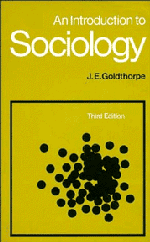Book contents
Summary
The institutional cluster with which this chapter is concerned is on a slightly different footing from the others, since social class, social differentiation, or inequality does not arise in quite the same direct way from any basic human need, nor is it quite universal in all human societies. As we shall see, however, the only known societies which can really be called classless are extreme cases. Inequalities are found in almost all societies, and even though not quite inevitable they offer a wide range for comparative treatment.
In nearly all societies the good things of life, the things that people desire, are unequally distributed; some have more, others less. When we ask – what good things? – the answer that sociologists have given, since Max Weber, is that they are to be thought of under three main heads: wealth, prestige and power. Wealth may be subdivided into income and capital. A person's income gives him a flow of wealth, that is command over goods and services, over time, while his capital means the stock of wealth which he possesses at a particular moment of time. Prestige means the extent to which a person is looked up to or looked down on, regarded as a sort of person to be admired or emulated or, on the other hand, treated with contempt. Power refers to the extent to which a person can influence or command the actions of others, make his will effective and make decisions.
- Type
- Chapter
- Information
- An Introduction to Sociology , pp. 140 - 162Publisher: Cambridge University PressPrint publication year: 1985

